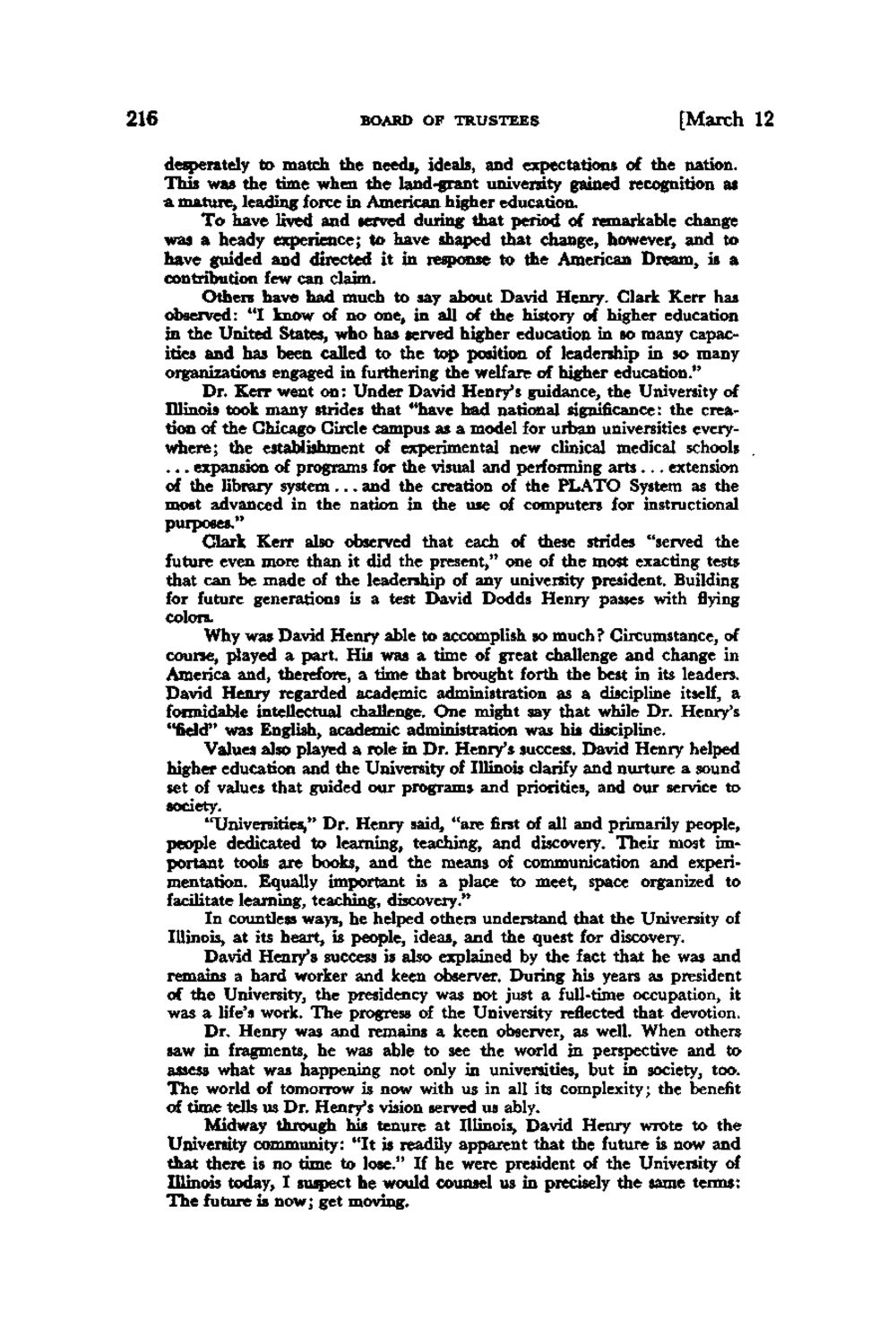| |
| |
Caption: Board of Trustees Minutes - 1988
This is a reduced-resolution page image for fast online browsing.

EXTRACTED TEXT FROM PAGE:
BOARD OF TRUSTEES [March 12 desperately to match the needs, ideals, and expectations of the nation. This was the time when the land-grant university gained recognition as a mature, leading force in American higher education. T o have lived and served during that period of remarkable change was a heady experience; to have shaped that change, however, and to have guided and directed it in response to the American Dream, is a contribution few can claim. Others have had much to say about David Henry. Clark Kerr has observed: "I know of no one, in all of the history of higher education in the United States, who has served higher education in so many capacities and has been called to the top position of leadership in so many organizations engaged in furthering the welfare of higher education." Dr. Kerr went on: Under David Henry's guidance, the University of Illinois took many strides that "have had national significance: the creation of the Chicago Circle campus as a model for urban universities everywhere; the establishment of experimental new clinical medical schools . . . expansion of programs for the visual and performing arts. . . extension of the library s y s t e m . . . and the creation of the PLATO System as the most advanced in the nation in the use of computers for instructional purposes." Clark Kerr also observed that each of these strides "served the future even more than it did the present," one of the most exacting teste that can be made of the leadership of any university president. Building for future generations is a test David Dodds Henry passes with flying colors. Why was David Henry able to accomplish so much? Circumstance, of course, played a part. His was a time of great challenge and change in America and, therefore, a time that brought forth the best in its leaders. David Henry regarded academic administration as a discipline itself, a formidable intellectual challenge. One might say that while Dr. Henry's "field" was English, academic administration was his discipline. Values also played a role in Dr. Henry's success. David Henry helped higher education and the University of Illinois clarify and nurture a sound set of values that guided our programs and priorities, and our service to society. "Universities," Dr. Henry said, "are first of all and primarily people, people dedicated to learning, teaching, and discovery. Their most important tools are books, and the means of communication and experimentation. Equally important is a place to meet, space organized to facilitate learning, teaching, discovery." In countless ways, he helped others understand that the University of Illinois, at its heart, is people, ideas, and the quest for discovery. David Henry's success is also explained by the fact that he was and remains a hard worker and keen observer. During his years as president of the University, the presidency was not just a full-time occupation, it was a life's work. The progress of the University reflected that devotion. Dr. Henry was and remains a keen observer, as well. When others saw in fragments, he was able to see the world in perspective and to assess what was happening not only in universities, but in society, too. The world of tomorrow is now with us in all its complexity; the benefit of time tells us Dr. Henry's vision served us ably. Midway through his tenure at Illinois, David Henry wrote to the University community: "It is readily apparent that the future is now and that there is no time to lose." If he were president of the University of Illinois today, I suspect he would counsel us in precisely the same terms: The future is now; get moving.
| |